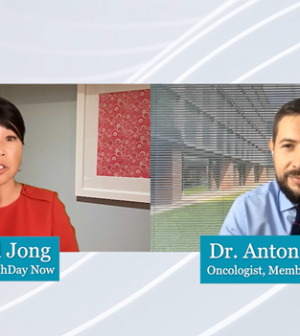- 10 Strategies to Overcome Insomnia
- Could Artificial Sweeteners Be Aging the Brain Faster?
- Techniques for Soothing Your Nervous System
- Does the Water in Your House Smell Funny? Here’s Why
- Can a Daily Dose of Apple Cider Vinegar Actually Aid Weight Loss?
- 6 Health Beverages That Can Actually Spike Your Blood Sugar
- Treatment Options for Social Anxiety Disorder
- Understanding the Connection Between Anxiety and Depression
- How Daily Prunes Can Influence Cholesterol and Inflammation
- When to Take B12 for Better Absorption and Energy
Trials Show COVID Vaccines Well Worth It for Cancer Patients

If you have cancer and you think coronavirus vaccines may do you little good, don’t let your hesitation stop you from getting the shots: A pair of clinical trials finds that patients’ immune systems ramped up after vaccination.
The findings were presented this week during a virtual meeting of the European Society for Medical Oncology (ESMO Congress 2021).
“We have to vaccinate all of our cancer patients, and we can assure them that the vaccine is very active, regardless of the kind of [cancer] treatment” they receive, ESMO spokesman Dr. Antonio Passaro said in a HealthDay Now interview.
The first COVID vaccine trials excluded cancer patients. So, it has been an open question whether the shots could protect people undergoing chemotherapy or immunotherapy, he explained.
But two European trials — VOICE and CAPTURE — have now shown that the vaccines do indeed protect patients from COVID infection, said Passaro, a lung cancer expert at the European Institute of Oncology in Milan, Italy.
The VOICE study involved nearly 800 patients in the Netherlands. It included people with and without cancer, as well as folks who were being treated with chemotherapy, immunotherapy or a combination of the two. They received Moderna’s two-dose mRNA vaccine.
About a month after their second vaccine dose, researchers found adequate levels of antibodies in 84% of patients on chemo; 93% of those on immunotherapy, and 89% of those who got combo chemo/immunotherapy.
Passaro said the results compare favorably to the high level of antibody response seen in more than 99% of the trial participants who didn’t have cancer.
“The high rates of efficacy of the vaccine observed across the trial population, regardless of the type of anti-cancer treatment, constitute a strong and reassuring message for patients and their doctors,” Passaro said in a meeting news release.
The trial also found that two doses are needed to achieve strong immunity in cancer patients. Only 1 in 3 chemo or chemo/immunotherapy patients achieved a sufficient response after their first shot — about half as many as in those who were cancer-free.
The CAPTURE trial involved nearly 600 cancer patients in the United Kingdom. They received two doses of either the Pfizer-BioNTech or the AstraZeneca vaccine.
About one-third had previously contracted COVID-19, and the vaccine produced higher levels of virus-neutralizing antibodies in those patients.
To hear more about the trials, watch the HealthDay Now interview:
Passaro said these results support the notion that cancer patients and other immune-compromised people need to get the full vaccine regimen, and might even need a booster dose for best results.
He pointed to another clinical trial among about 230 cancer patients in Israel. Of those, fewer than a third developed antibodies after their first dose of the Pfizer vaccine. When they got their second dose, nearly 9 in 10 achieved an adequate immune response.
“The results confirm that for our patients, we need a full vaccination,” Passaro said. “All of our cancer patients should be vaccinated for COVID-19, regardless of the kind of vaccine.”
Findings presented at medical meetings are considered preliminary until published in a peer-reviewed journal.
More information
The American Cancer Society has more about COVID vaccines and cancer.
SOURCES: Antonio Passaro, MD, PhD, lung cancer expert, European Institute of Oncology, Milan, Italy; ESMO Congress 2021, virtual meeting, Sept. 16-21, 2021
Source: HealthDay
Copyright © 2026 HealthDay. All rights reserved.










